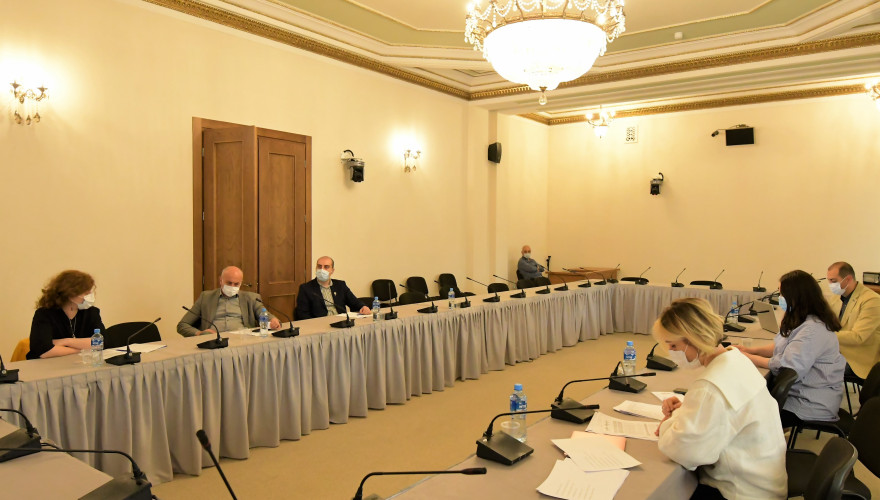The verbal hearings of the Agrarian Issues Committee on the Oversight of the Enforcement of the Law on Agricultural Cooperatives

The Committee held the verbal hearing, presided by the Chair, Nino Tsilosani on the oversight of the enforcement of the Law on Agricultural Cooperatives.
The Head of the UNDP Economic Development Team, Giorgi Nanobashvili, President of the Association for Farmers Rights Defense, Doctor of Agrarian Sciences, Kakha Nadiradze, Deputy Chair of the Farmers’ Association, Rati Kochlamazishvili, representatives of the Association of Biological Sciences, Elene Shatberashvili and Irakli Javakhishvili, representative of the non-commercial legal entity “Kvemo Kartli Media”, Manon Bokuchava and the Chair of the Association of Women Farmers, Irine Pkhovelishvili introduced their positions about the gaps revealed in the enforcement of the Law.
They introduced the impeding factors and hoped that the active cooperation with the Committee, initiated by N. Tsilosani, will positively result in the improvement of the Law to facilitate the real enhancement of the agricultural cooperatives.
According to G. Nanobashvili, the Law did facilitate the establishment of the cooperatives, though revealed the problems of sustainability due to the failure to facilitate further development of the cooperatives. The Law shall provide the norms to prevent the establishment of the cooperatives for benefits only.
According to K. Nadiradze, analysis of the situation and the problems, expressed in the low motivation of the farmers indicate the gaps in the Law. The editorial or structural changes are not enough to improve the Law. He expressed his commitment to offering the new version based on the successful models of Central Europe, Eastern Europe, the USA and other countries.
The Farmers’ Association believes that the first stage of the enactment of the Law and especially the ENPARD financing programs facilitated the public awareness on cooperatives, though information on successful cooperatives has not been studied and provided to society, which entails the negative attitude to the cooperatives.
R. Kochlamazishvili dwelt on the impeding factors, negative attitude of the farmers, bureaucracy, absence of the tax remissions, negative attitude of the banks to the cooperatives etc.
According to the Association of Biological Sciences, the cooperatives encounter problems in Georgia due to the legal gaps. The guests heard the promise of the Committee to be engaged in addressing the problems. The Parliament already discusses the Law on Entrepreneurs.
According to M. Bokuchava, the lack of information entails confusion in the farmers, which further aggravates the activity of the cooperatives. He named the infrastructural problems as the impeding factors, namely the problem of the roads and energy supply.
According to women farmers, the legal base and state support are not enough for the development of the cooperatives, it requires special state programs, respective skills and technical equipment.
The parties outlined the necessity of education about the cooperatives and noted that promotion will ensure success. The cooperative shall be promoted through various channels, social networks, media etc. to advertise the Georgian agricultural products. The state shall launch the programs to encourage the cooperatives. The parties named the low quality of information of specification of cooperatives amongst the farmers, including the lack of specialists. The deficit of qualified personnel and lack of accountants, financial managers and agronomists impede the effective activity of the cooperatives. The state, in view to eradicate poverty and support the cooperatives, ensure public awareness on European standards in agricultural production, recycling, packaging, storage and sale, finance management, risk assessment etc.
The inquiry revealed that other than the financial support, the cooperatives need higher accessibility to the state agencies to ensure a due response to the problems of the cooperatives. The creation of the cooperatives, as stated, is the state priority, though the outcomes are not as expected due to the problems that cannot be addressed by the cooperatives without state support. The engagement of the Committee and joint efforts will facilitate the activity of the cooperatives, as the parties agreed.
The Committee will ensure oversight on enforcement of the Law and hear the responsible agencies – Environmental Ministry.
After the verbal hearings, the committee will develop the conclusion and recommendations.
The project is backed by WFD, EU and UNDP.
